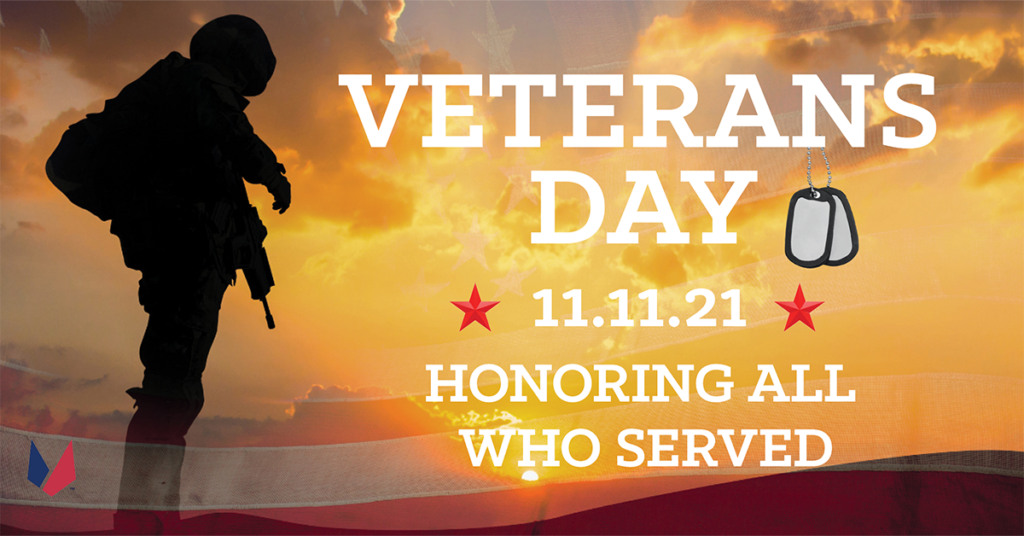Celebrating Our Nation’s Heroes

Armistice Day was a day set aside to reflect the bravery of those who died in our country’s service. November 11th was chosen because it is the anniversary of the Armistice signing that ended World War I formally recognized at the 11th hour, of the 11th day, of the 11th month in 1918. In 1954, the holiday was changed to Veteran’s Day to account for all veterans in all current and past wars. Sixty-seven years have passed since then, and today we still stop and remember those who served and continue to serve on November 11th.
Many of our Veterans will say it was an honor when describing their time in the military.
Veterans learn to serve and not ask for anything in return. As life speeds forward, recognizing the need for assistance with simple daily tasks is difficult. Accepting that support can be even more difficult. This is where home care can help. Home care provides services in the place they call home, allowing them to remain as independent as possible. So how do you know it’s time for home care? Here are five questions to ask:
- Is the Veteran in my life struggling to walk independently? Has there been a recent fall? 1 out of 5 falls causes a severe injury, including 90% of hip fractures and 51% of traumatic brain injuries. Other potential consequences of falls include restricted activity, loss of independence, and premature death. The fatality rate from falls has been increasing, particularly among those ages 85 and older. [i]
- Is the home unusually cluttered, unkempt? Is there a stack of unopened mail? As people age, mobility limitations, loneliness, or cognitive changes can make household chores more challenging.
- Has your Veteran’s appearance changed? The first sign that someone may have trouble living alone is a change in personal hygiene. Personal hygiene can affect a person’s health, social interactions, and emotional well-being. This can be caused by physical or cognitive loss, depression, or psychological changes.
- Does your Veteran have poor eating habits? Seniors who do not get the proper nutrition or hydration may have symptoms disguised as a disease or illness. Interest in eating may change over time. Often taste buds decrease, causing food to taste bitter or sour. The loss of smell makes food less appealing and can lead to poor food choices. They can also experience an increasing disconnect between how hydrated their bodies are and how thirsty they feel.
- Is your Veteran less social? Do they spend a lot of time alone? Being less social can seem harmless, but the National Institute on Aging says research has linked social isolation and loneliness to higher risks of high blood pressure, heart disease, obesity, depression, cognitive decline, Alzheimer’s disease, and more. Social interaction improves physical, mental, and emotional health.
These signs provide a good start on discussing the Veteran or surviving spouse’s need for assistance at home. Home care is a gift of independence to someone who fought for our independence. The gift of home care provides access to personal care and assistance. Healthy home-cooked meals can be provided along with conversation and an after-dinner walk. Maybe a quick card game or trip down memory lane with old photos.
At Veterans Care Coordination, we strive to make sure every Veteran and surviving spouse has access to home care. One way we help is by introducing them to the Pension with Aid and Attendance benefit.
Aging Veterans and surviving spouses may be eligible for the VA’s benefit Pension with Aid and Attendance to ease the financial burden of paying for much-needed home care. Veterans Care Coordination strives to help as many Veterans and surviving spouses as possible gain access to the home care they need in order to continue living the high-quality of life they deserve.
Our partner providers join Veterans Care Coordination in the mission to improve the quality of life for Veterans and their families. We partner with quality home care providers to help navigate the VA’s application process for pension funds, maximize the VA pensions benefits, and get care started as quickly as possible.
Source:
[1] https://www.americashealthrankings.org/explore/senior/measure/falls_sr/state/U.S.
